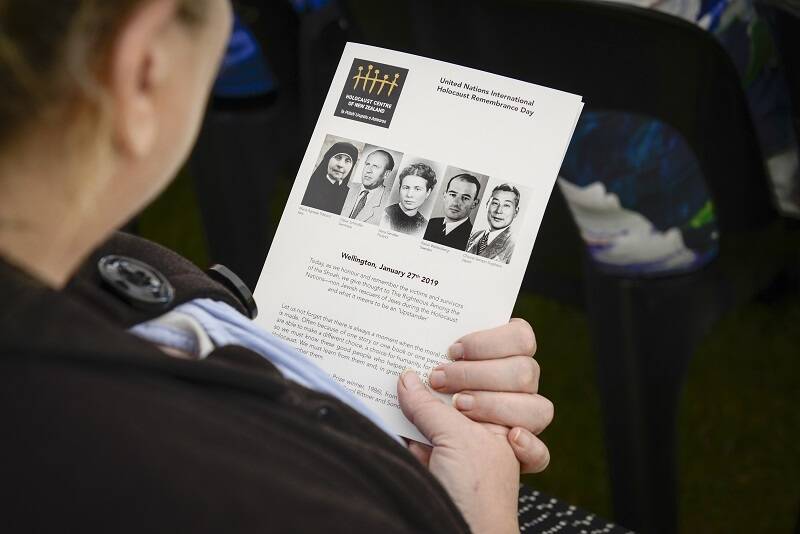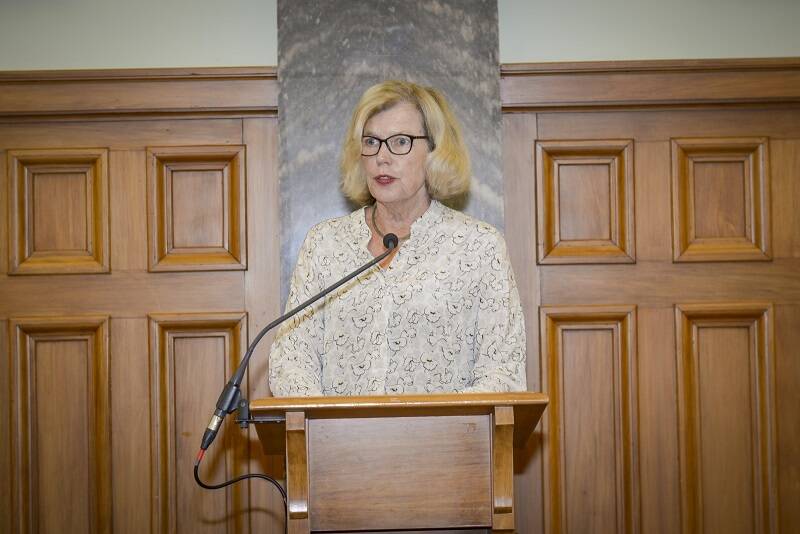Remembering the Holocaust
On Sunday 27 January, events around New Zealand commemorated United Nations International Holocaust Remembrance Day and the 74th anniversary of the liberation of Auschwitz.
Marking this important day
The National Commission recognises the importance of marking this day, to raise awareness about the need to nurture peace and human rights. As well as being an opportunity to commemorate the victims and their legacy, it is also a day to alert people of all ages around the world about the dangers of racist and fanatic ideologies.

We supported commemorations in Wellington at Makara Cemetery; in Auckland at Nga Wai o Horotiu Marae – the AUT marae; and in Christchurch at the Botanic Gardens. A commemoration was also held in Hamilton at Memorial Park. Chair Robyn Baker and Secretary General Vicki Soanes participated in the Wellington commemoration.
This year there was a focus on the Righteous Among the Nations – the non-Jews who risked their lives to save Jews from extermination.
Below is the speech that Robyn Baker delivered at the event at Parliament:
Robyn's Speech

E ngā mana, e ngā reo, e rau rangatira mā
Tēnā koutou, tēnā koutou, tēnā koutou katoa
(To all authorities, all voices, to the many chiefs gathered here
Greetings, greetings, greetings to everyone)
Warm Pacific greetings to you all and thank you to the Holocaust Centre of New Zealand for inviting me to speak today.
I will begin my address with a question. How well do we know ourselves?
Imagine this scenario. You arrive home this evening and a stranger knocks on your door. Their eyes are full of fear and they beg you to hide them. They tell you that somebody is after them and wants to kill them. Would you agree to hide them? I imagine most of you are thinking ‘yes, of course I would’. However, think about it just a little more. What if you know that helping this person could result in you going to jail? Or even worse, what if the penalty for you and your entire family for hiding them was death? Would you still say yes? The situation suddenly becomes more challenging, doesn’t it? We like to think we’d help, but the reality is that to help would require enormous courage.
The topic of this year’s Holocaust Remembrance Day is a challenging one – for nations, for communities and for each one of us. It is easy to say what we might do; so much harder to know how we might act if asked to step up; to be an upstander and not a bystander. As I pondered this topic, I reflected on the two values that I have found to be so important in my professional life – the values of courage and generosity. These now seem critical to leading a meaningful life as well; one where we feel compelled to always act with courage and generosity.
The history of the Holocaust reveals a range of behaviour that people are capable of when confronted with extreme brutality toward their fellow human beings. While the Nazis carried out their plans to murder millions of Jews and other supposedly inferior groups, many non-Jewish individuals and groups risked their own safety to protect, hide or evacuate people in danger. However, these upstanders were the exception rather than the rule. While we in no way condone the actions of the majority, we are still able to understand in some way why they remained silent. While we all like to think that we would stand up for oppressed peoples, failing to act is equally as human.
During World War II, for every rescuer there were countless others who were aware of what was happening. They could have actively helped out. Yet they chose to stand by. At most, 5 to 10% of the Jews who survived the Holocaust in Europe did so because they were concealed and looked after by a non-Jew or non-Jewish organisation. But in the end, the Nazis succeeded in murdering 6 million of the estimated 9 million Jews who lived in Europe in 1939.
It’s extremely confronting to think about this. How could people have allowed this to happen? And what was different about the ones who helped? Clearly, it’s not as black and white as we might first think.
There are so many stories of people who took risks, large and small, on behalf of others. We need to keep telling these stories so that we might better find within ourselves the courage to be “someone who helps” and to act with caring toward others when the opportunity arises, even when it is so risky individually as well as to loved family members.
Stories like the one of Johanna and Frits Hakkens, Dutch immigrants who moved to New Zealand in the 1960s. The Hakkens were the first Kiwis to be honoured with a Medal of the Righteous Among the Nations of the World award from Israel for risking their lives during the war by hiding a two-year-old Jewish girl. For two years they hid her in the attic, and sometimes in a cupboard. She was passed on to another member of the Resistance before her uncle could pick her up and reunite her with her mother and sister in Switzerland.
The Hakkens were members of the Dutch Resistance. Johanna sewed diamonds in the coats of Jewish children and Frits, who worked at the airport, sabotaged Nazi planes.
Their son Marcel Hakkens accepted the award posthumously on behalf of his parents, saying the award kept his parents’ bravery alive and taught future generations they too could make a difference.
I recently came across a quote by a psychologist called Ervin Staub who did a study of some of the war-time rescuers. He states, “Goodness, like evil, often begins in small steps. Heroes evolve; they aren’t born. Very often the rescuers made only a small commitment at the start—to hide someone for a day or two. But once they had taken that step, they began to see themselves differently, as someone who helps. What starts as mere willingness becomes intense involvement”.
In other words, once people begin on the path of compassion towards their fellow humans, they are compelled to continue on this path.
Individual action is of course important—essential—but how much more powerful when the action is supported by others.
That is also why organisations and individuals who provide opportunities for people of all ages to develop the knowledge, skills, values and attitudes that can help prevent current day group-targeted violence are so important. The Holocaust Centre is of course one such organisation. The Human Rights Commission and its ‘Given nothing to Racism campaign’, is another excellent example. The campaign promoted a community-wide conversation, signalling that racism can begin in small ways and that each one of us can make a difference if we are attentive and prepared to take action.
UNESCO is another important organisation that places its priority on building and sharing knowledge, seeking a more just and peaceful world through supporting individual and collective action.
Education about the Holocaust and genocide is part of UNESCO’s efforts to promote Global Citizenship Education. In this context, UNESCO supports education stakeholders in their efforts to help learners become critical thinkers, responsible and active global citizens who value human dignity and respect for all, and reject anti-Semitism, racism and other forms of prejudice that can lead to violence and genocide.
UNESCO believes it is essential to learn about the history of the Holocaust in order to better understand the causes of societies’ descent into genocide and to raise awareness about the need to nurture peace and human rights to prevent further mass violence. This International Day of Remembrance is an opportunity to commemorate the victims and their legacy, as well as alert people of all ages around the world about the dangers of racist and fanatic ideologies.
By examining the stories and choices that were made during the Holocaust, we are not only better able to understand what happened but we can reach a deeper understanding of the range of human behaviour in any time of crisis. By examining what happened we can gain insight into the forces in our own lives that might encourage us to act cruelly or inhumanely, or to ignore such actions by others. At the same time we can also ensure that we have established and sustained the conditions within our communities that support each one of us to learn and build our understanding, and to be courageous in taking action; so each one of us is inspired and compelled to lean into taking a stance, to be courageous and generous.
Dr Martin Luther King, Jr once said, “The moral arc of the universe is long, but it bends towards justice.” Each one of us has our own moral arc. We can help create justice in our own neighbourhoods and communities. Before long, that moral arc will spread throughout the world.
Let us all recognise that we can make a difference to the world. We can use our individual and collective knowledge and energy to build a more just world – all it takes is courage, generosity and a willingness to act.
